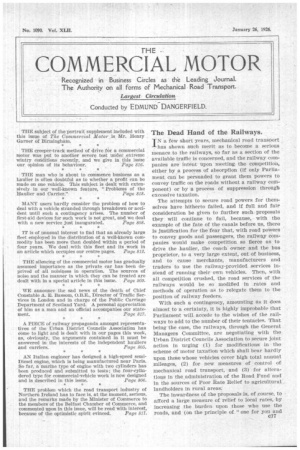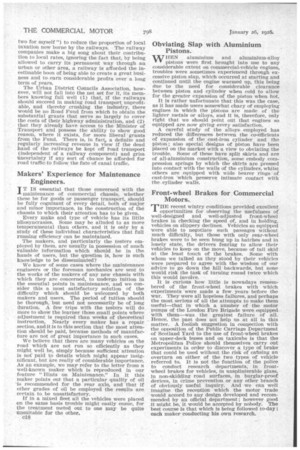The Dead Hand of the Railways.
Page 1

Page 2

If you've noticed an error in this article please click here to report it so we can fix it.
TX a few short years, mechanical road transport 4-has shown such merit as to become a serious menace to the railways, so far as a section of the available traffic is concerned, and the railway companies are intent upon meeting the competition, either by a process of absorption (if only Parliament can be persuaded to grant them powers to convey traffic on the roads without a railway component) or by a process of suppression through excessive taxation.
The attempts to secure road powers for themselves have hitherto failed, and if full and fair consideration be given to further such proposals they will continue to fail, because, with the example of the fate of the canals before us, there is justification for the fear that, with road powers to convey goods and passengers, the railway companies would make competition so fierce as to drive the haulier, the coach owner and the bus proprietor, to a very large extent, out of business, and to cause merchants, manufacturers and traders to use the railway-provided services instead of running their own vehicles. Then, with all competition crushed, the road services of the railways would be so modified in rates and methods of operation as to relegate them to the position of railway feeders.
With such a contingency, amounting as it does almost to a certainty, it Is highly improbable that Parliament will accede to the wishes of the railways to add to the number of their tentacles. That being the case, the railways, through the General Managers Committee, are negotiating with the Urban District Councils Association to secure joint action in urging (1) for modifications in the scheme of motor taxation which shall bear hardly upon thOse whose vehicles cover high total annual mileages, (2) for new measures of control of mechanical road transport, and (3) for alterations in the administration of the Road Fund and in the sources of Poor Rate Relief to agricultural landholders in rural areas: The inwardness of the proposals is, of course, to afford a large measure of relief to local rates, by increasing the burden upon those who use the roads, and (on the principle of." one for you and two for myself ") to reduce the proportion of local taxation now borne by the railways. The railway companies make a big song about their contribution to local rates, ignoring the fact that, by being allowed to carry its permanent way through an urban or other area, a railway is afforded the inestimable boon of being able to create a great business and toearn considerable profits over a long term of years. The Urban District Councils Association, however, will not fall into the net set for it, its members knowing full well (1) that, if the railways should succeed in making road transport, unprofitable, and thereby crushing the industry, there would be no Road Fund from which to obtain the substantial grants that serve so largely to cover the costs of their highway administration, and (2) that they already have access to the Minister of Transport and possess the ability to show good reason, where it exists, for more liberal grants from the Fund. There is, in fact, a definite and regularly increasing revenue in view if the dead hand of the railways be kept off road transport (independent of a railway component) and grim uncertainty if any sort of chance be afforded for road traffic to follow the fate of canal traffic.
Makers' Experience for Maintenance Engineers.
IT IS essential that those concerned with the maintenance of commercial chassis, whether these be for goods or passenger transport, should be fully cognizant of every detail, both of major and minor importance, in the construction of the chassis to which their attention has to be given. Every make and type of vehicle has its little idiosyncrasies. Some may be alluded to as more temperamental than others, and it is only by a study of these individual characteristics that full running efficiency can be maintained. The makers, and particularly the testers employed by them, are usually in possession of much valuable information which should be in the hands of users, but the question is, how is such knowledge to be disseminated? We know of some cases where the maintenance engineers or the foreman mechanics are sent to the works of the makers of any new chassis with which they are -concerned, to undergo tuition in the essential points in maintenance, and we consider this a most satisfactory solution of the difficulty which should be welcomed by both makers and users. The period of tuition should be thorough, but need not necessarily be of long duration. A few trips with the testers will do More to show the learner those small points where adjustment is required than weeks of theoretical instruction. Nearly every maker has a repair section, and it is to this section that the most attention should be paid, because methods of manufacture are not of great importance in such cases. We believe that there are many vehicles on the road which are not run so efficiently as they might well be, simply because sufficient attention is not paid to details which might appear insignificant, but are really of considerable importance. As an example, we may, refer to the letter from a well-known maker which is reproduced in our feature "Hints on Maintenance." In it this maker points out that a particular quality of oil is recommended for the rear axle, and that if other grades of oil be employed the results are certain to be unsatisfactory. If in a mixed fleet all the vehicles were placed on the same basis trouble might easily ensue, for the treatment meted out to one may be quite unsuitable for the other. c18
Obviating Slap with Aluminium Pistons.
WHEN aluminium and aluminium-alloy pistons were first brought into use to any considerable extent on commercial-vehicle engines, troubles were sometimes experienced through excessive piston slap, which occurred at starting and continued until the engine warmed up, this being due to the need for considerable clearance between piston and cylinder when cold to allow for the greater expansion of the piston when hot. It is rather unfortunate that this was the case, as it has made users somewhat chary of employing engines in which the pistons are made of the lighter metals or alloys, and it is, therefore, only right that we should point out that engines so equipped are now giving every satisfaction. A careful study of the alloys employed has reduced the differences between the co-efficients of expansion of the cast-iron cylinder and the piston ; also special designs of piston have been placed on the market with a view to obviating the trouble. Some of these have split skirts and are of all-aluminium construction, some embody compression springs by which the skirts are pressed into contact with the walls of the cylinders, whilst others are equipped with wide bearer rings of cast-iron which preserve intimate contact with thecylinder walls.
Front-wheel Brakes for Commercial • Motors.,
ry" HE recent wintry conditions provided excellent -L opportunities for observing the usefulness of well-designed and well-adjusted front-wheel brakes in checking the speed of, and in holding, vehicles on slippery declines. Vehicles so equipped were able to negotiate such passages without much difficulty, but those with only rear-wheel brakes were to be seen hung up in batches and in lonely state, the drivers fearing to allow their vehicles to keep on the move, because of tail skid at the least touch of the brakes. Some with whom we talked as they stood by their vehicles were prepared to agree with the wisdom of our advice to go down the hill backwards, but none would risk the task of turning round twice which this would involve. It is curious how little is nowadays remembered of the front-wheel brakes with which experiments were made a few years before the war. They were all hopeless failures, and perhaps the most serious of all the attempts to make them useful—that in which a number of the motor pumps of the London Fire Brigade were equipped with them—was the greatest failure of all. Hence, the past does not help us at all in this matter. A foolish suggestion in connection with the opposition of the Public Carriage Department of Scotland Yard to the use of front-wheel brakes on upper-deck buses and on taxicabs is that the Metropolitan Police should themselves carry out experiments in order to discover a type of brake that could be used without the risk of causing an overturn on either of the two types of vehicle referred to. It is not the function of the police to conduct research departments, in frontwheel brakes for vehicles, in unsplinterable glass, in non-skidding road surfaces, in burglar-proof devices, in crime prevention or any other branch of obviously useful inquiry. And we can well imagine the reception which the motor trade would accord to any design developed and recommended by an official department; however good it might be, it would be accepted by nobody. The best course is that which is being followed to-day: each maker conducting his own research.




























